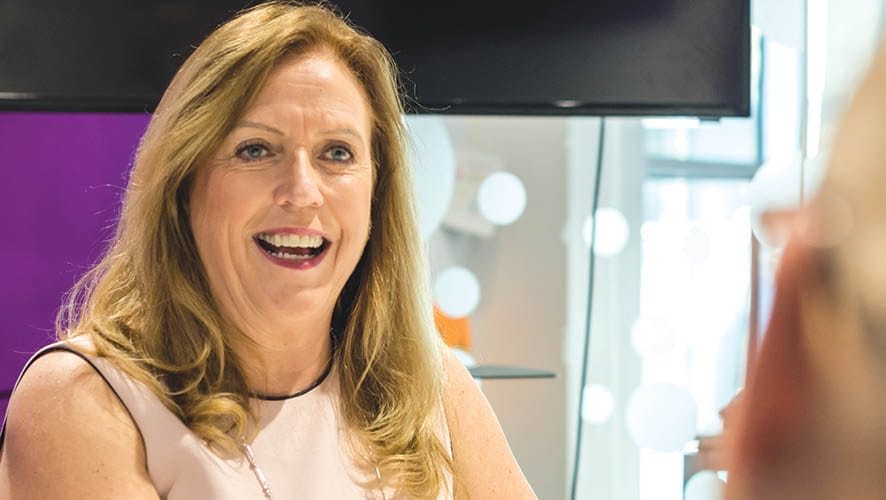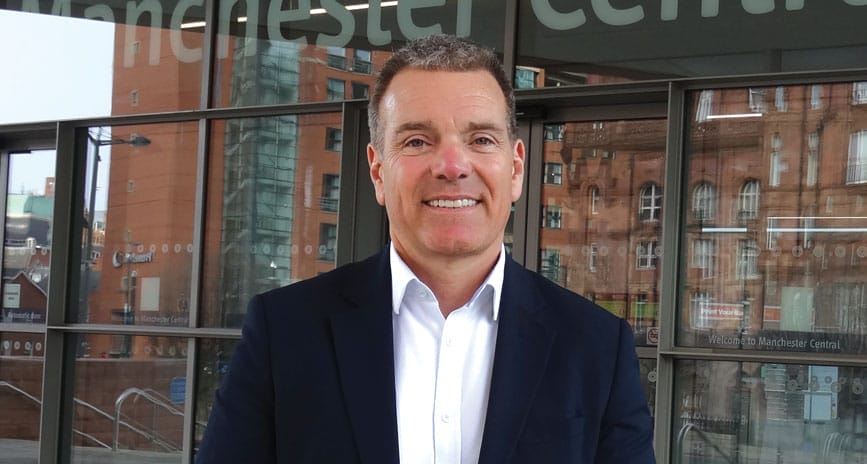Jenny Campbell rose to fame recently on her appearance on Dragons’ Den, joining the Dragons in 2017. Originally from Hyde in Tameside, Jenny spent over 30 years initially with the Royal Bank of Scotland Group. Her role as an Entrepreneur took off with an MBO of an ATM business through the bank, and since joining the Dragons has been involved with charities and projects that support entrepreneurs and disadvantaged young people. Jenny stepped down from the Den this year, however, she continues to actively support entrepreneurship as well as a spokesperson for diversity, and aims to inspire a new generation of equality within business. GM Business Connect caught up with Jenny in Manchester for an exclusive interview:
What was the Dragons’ Den experience like?
“I was excited. I had watched it since it was first on and never in a million years thought I would be on there too. I am very keen at grasping opportunities and in 2017 when I saw that two dragons were stepping down, I very quickly said to my head of marketing ‘that will be my seat’! I was half joking but also half serious. Life is full of surprises.”
Are there any businesses on Dragons Den you wished you invested in but missed out on?
“I’d say ‘lost’ rather than missed out – because they chose someone else to invest. In the first series I bid for a gin business based in Scotland but I was up against Peter Jones and they chose him. I really wanted that business, however, I also believe that things happen for a reason and in the next series I was chosen to invest in a Manchester gin business which is much closer to home for me. The one that got away at the time (that again Peter got instead of me) was a drone business. I was rather cross. My husband is in the air force and does fly, and I felt we could have brought an amount of commercialism to that business – and I did feel I’d lost out. However, looking at recent events with drones at airports, I feel ok now. I think if an entrepreneur doesn’t pick me, it’s their loss and I move on.”
How did you initially start your own business?
“I didn’t start as an entrepreneur. I was a career banker for 30 years, and I thought I’d be there for 40 years and collect my pension. I had worked my way up from age 16 counting cash in local branches, progressing through regional roles and thinking I could maybe make regional manager. However, I realised there were even more senior jobs but that I’d need to go to London. After reading in a magazine about a woman ten years older than me who was in a very senior position in a bank, who did this and raised a family at the same time, I contacted her to ask if I could see her. This meeting resulted in a job offer in London in the late 90’s. RBS came along and I fulfilled a number of key roles for them, then in 2006 I went in to their cash machine business (purchased in 2004) where there was a great opportunity to go and work in an end-to-end business that had its own P&L, budgets, and a smaller workforce with only 150 people. I felt I could make a difference there as chief operating officer. It was in chaos, having grown so fast, and so we needed to start a number of projects to fix things with discipline and control such as the quality of the people, increasing sales and efficiency of product delivery.
“When I went there in 2006 it was losing £7 million a year; when I sold it in 2016 it was making £7 million a year. A ten year journey in which for the first 2 years I was still a bank employee. The 2008 financial recession came and where there are challenges for some there are opportunities for others. It was the case for me as I was asked to sell the business by the bank. During that year, I realised I simply wasn’t proud to be a banker anymore and that I loved this business that we had nurtured back to health. It had potential, and I wanted to see it achieve more. I didn’t want to see it stripped for assets and its people made redundant. I had a lightbulb moment and approached the bank to see if ‘we the management’ could buy it. The answer was yes, and we bought it in 2010. This was much scarier than Dragon’s Den when the ‘mothership’ floated away and I was no longer paid on the 18th of every month. Instead I was writing wage cheques for £250,000 every month! It was exciting but among the scariest moments of my life. I mortgaged my house to put in my contribution to it.”
What businesses are you involved with now and which one stands out and why?
“I have some investments from Dragons’ Den and other things I’m looking at as a result of the Den too. I have completed investments in Ed Holland’s Driven Media business – selling advertising media on lorries. He is a very inspirational young entrepreneur. Also, LAMB (Look After My Bills, energy switching company) which is different and better than Go Compare or Compare the Market. They will take your data and carry on switching on your behalf for you each year so you don’t have to do that nauseating task every renewal. I find this is a very ethical business as they hold the energy companies to account in getting the best deals for those who are on lower incomes. It’s a tech business but in consumables. My other one is Carun UK (CBD infused hemp products) where cannabis without psychoactive substances are used in ointments, creams and oils. We are selling to Holland & Barrett and it’s all organic. It is increasingly popular and it’s a business that is offering an alternative to people who want to explore amazing cannabis potential. Another business is Didsbury Gin – a start-up with very down to earth Mancunians. A real sense of fun and very driven to achieve success in a growing market. I’ll look at other businesses too so I’ve developed a site called Invest In Me, and I encourage entrepreneurs to contact me to see if I can help in some way – point them in the direction of funding and networking for example.”
To what do you attribute your success?
“Until I took over the cash machine business, I hadn’t really thought about this. When I won the Business Woman of the Year Award in 2014, one of the judges asked me ‘what took so long?’ I realised then that the bank gave me so many skills which I steadily acquired over many years. I learned how to sell, manage operations and risk, to strategise and so on. Being in banking gave me an enormous set of skills and built my confidence. In the 90s, as a bank manager I was also visiting all sorts of businesses. If I look back over my family history, 100 years ago my forefathers were entrepreneurs – my great-grandfather was a builder and built many of the pubs and schools in Hyde, and my other great-grandfather was a printer. The world of professions came along for the next generation where people were encouraged to have stable jobs, and now the world has changed again, and young people don’t want to work for 30 years for the same company. I am delighted that true entrepreneurship is back in the UK – with a vengeance.”
What are your responsibilities in running your investments and businesses?
“I’m a shareholder, and depending on where the businesses are, my role changes. Some only need a light touch, others need more intervention. First and foremost I am there to put some cash in to the business in return for equity. Secondly, I am there to help with strategy – how can it scale up? How can it go global or online? Thirdly, it’s my ‘black book’ of contacts because I can help open doors.”
Do any of your companies help the community where they are located?
“When I had my own business I was always very strong on ensuring that we are putting something back – I like animals so we did something with dogs for the disabled. Didsbury Gin are very supportive of initiatives in Manchester and the others all put back too. It’s very important as it shows that you value your people and that you are able to give something to the community you are passionate about.”
What message would you give to someone who feels they would like to take the leap of faith and go into business, whether a service or product?
“You should never have any regrets – always follow your dreams. Don’t underestimate the amount of hard work and risks it will take – the older you get the more entrenched you are in receiving a salary to support your family and growing commitments – a mortgage for example. However, regardless of how hard it gets, if you believe in it, you’ll never have regrets in trying.”
What is your view on national chain stores closing down?
“There is still a need for the high street. People want to look and touch and feel things. Things have a habit of evolving – yes we are in a world of buying online, but will it tip back? People may tire of all the online deliveries and returns and the carbon footprint that comes with it. They said newspapers would disappear too! It’s a matter of finding a strategy to adapt to the consumers’ needs.”

Who inspires you?
“I like to read autobiographies of those successful in business or public life. I read the Michelle Obama book and that was really inspirational – how she adapted her career to support Barack and their children and now her own future. I’m now reading about Clementine Churchill and how she was the strong woman behind Churchill’s success. There is no ‘one person’ – I look at business people and I’m inspired by those around me setting up their businesses. I take my inspiration from lots of diverse sources.”
Is there a legacy you’d like to be remembered for?
“Inspiring others. My strapline on Twitter is ‘be the best you can be’. I do think women particularly hold themselves back and I have a phrase: ‘There is no such thing as glass ceilings – only sticky floors’. Women just aren’t as forward as men in thinking about the possibilities of what they can achieve and what money they can ask for from a job. On applying for roles with me, women will look at the criteria and say ‘I can only tick 8 out of 10 requirements, so I’m not ready to apply’, but the man who glances at the advert will say ‘I can do that job’. Men will also expect the highest salary available whereas women tend to aim lower. This needs to change. I’d be delighted if I can go a small way to make a difference.”
Why did you leave Dragons’ Den, and would you ever go back?
“I never say never to anything! However, the reason I left was to focus on supporting my entrepreneurial sons and my charities – Princes Trust and Animal Health Trust. Since the official statement I have also been approached by a several Production Companies to do my own business troubleshooting show – so watch this space!”




